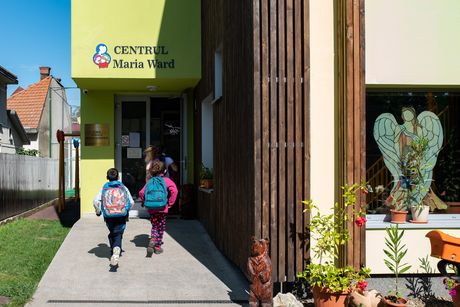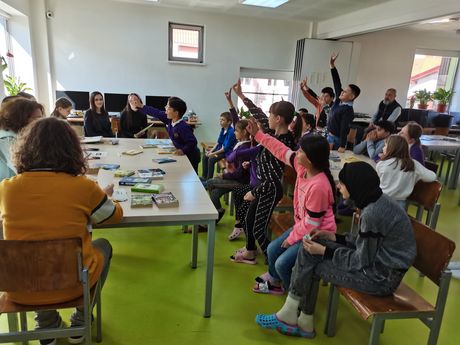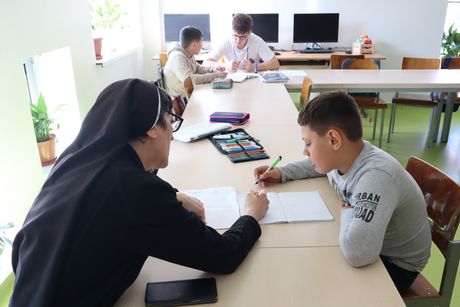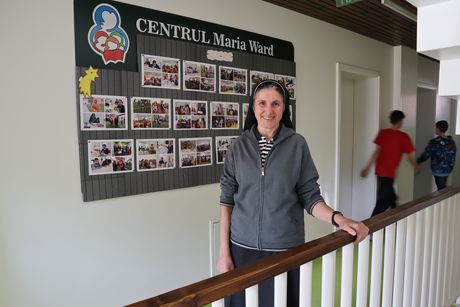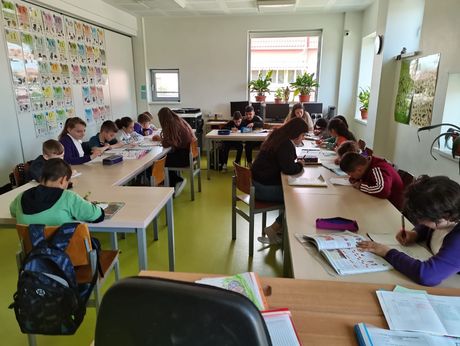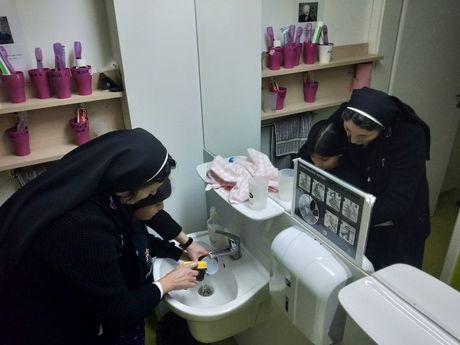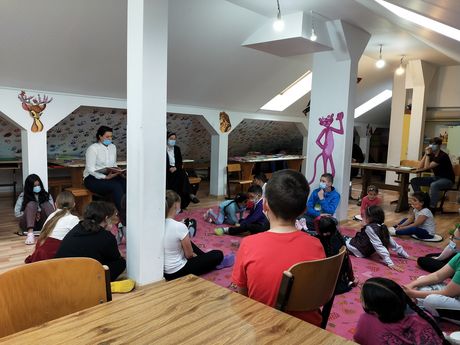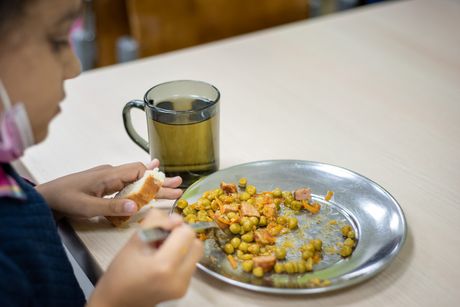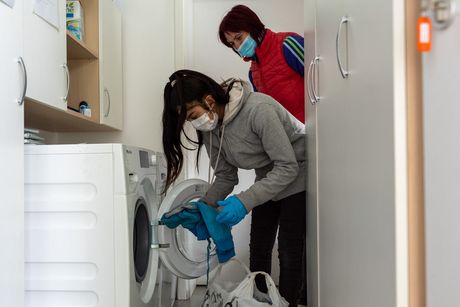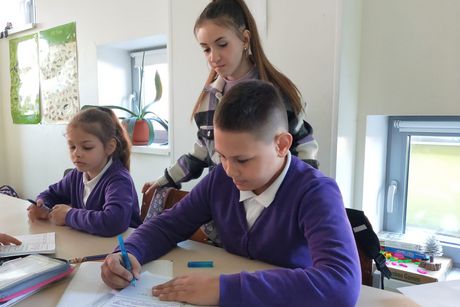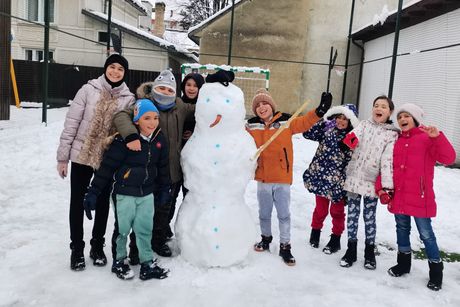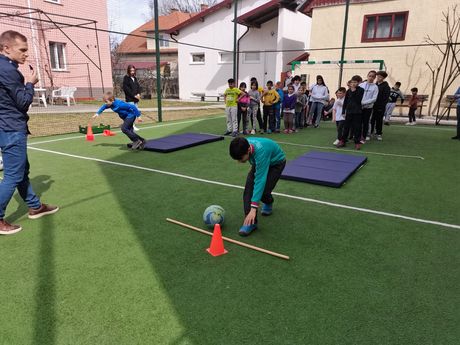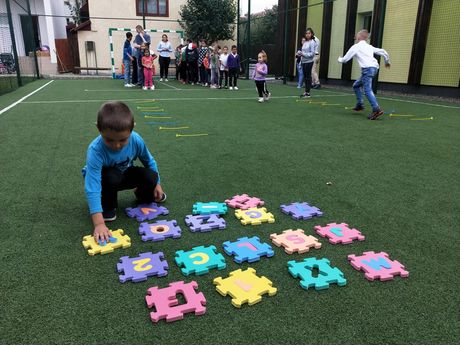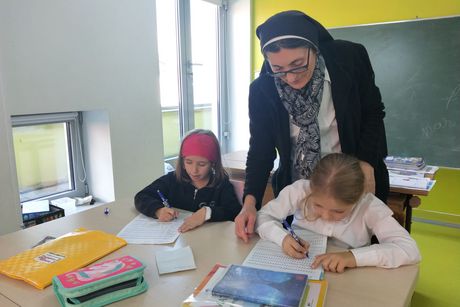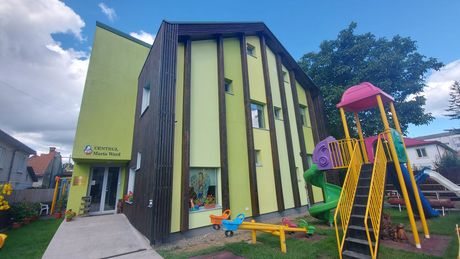HS Timber continues to prevent school dropout
It's an afternoon like any other day of the week. We're walking in the courtyard of the Maria Ward Social Centre in Rădăuți, Romania. The tall, cheerful green building with wooden elements, guarded by a walnut tree, invites you inside.
Once inside the classroom, one sees a crowd of children. Some children are looking for information about great Romanian poets on the computer. Other children are reading. Most are busy at their desks with homework. Sometimes they can do it on their own, but most of them need help. They are happy that the educators and volunteers of the centre are close to them whenever they need it.
We learn from the centre's coordinator that a group of children are in the counselling room with the centre's psychologist. In total, about 50 children, from kindergarten to the eighth grade, come to the Maria Ward Social Centre every day after school.
The children are at risk of dropping out of school and this is where the Maria Ward Social Centre's mission comes in.
Are there still school dropouts in 2023?
Sister Luiza is the coordinator of the Maria Ward Centre in Rădăuți and, she says she strives to continue this beautiful mission in the service of the community of Rădăuți, in favour of vulnerable children who come from families in need, with few possibilities of normal development and daily school attendance.
“There is still school dropout in 2023 because a lot of conditions are met for that," says Sister Luiza. "And I want to build up on this aspect, because we all need to be aware of the reality in the local community.
“The daily needs of the families are numerous, from the lack of sufficient food to the lack of running water, electricity, firewood or medicines. At home, children do not have the right environment or support for development. Often, positive parental role models are missing, so they don't see school as a natural direction to follow.
“Added to all this is the marginalisation and discrimination children face due to deprivation and poverty. Or ethnicity. These things put a heavy strain on their development. And that's where we come in."
What does the Maria Ward Social Centre do in this regard?
"We support these children in their daily school education by helping them with their school homework, to prepare them for the future, to overcome their social condition of inherited poverty. Therefore, at the Maria Ward Social Centre we work with teachers, pedagogues, social workers, speech therapists, psychologists and auxiliary staff,” says Sister Luiza.
“Because the possibilities at home are minimal, we also support the children with a hot meal every day, and also hygiene and health education, and specifically with showering and washing clothes both for the children and, sometimes, for family members. We provide speech therapy sessions for those with speech problems, regular sessions, and psychological counselling in order to overcome the acute problems and traumas they have experienced and are experiencing in the family due to violence and physical and verbal aggression of adults, due to excessive alcohol consumption or certain diseases and obviously acute poverty. In addition, we also support the extended family of our beneficiaries. That is, we help our beneficiaries' siblings when they need it.”
Regardless of ethnicity or religious denomination, children receive at the Centre the understanding and framework they need to overcome their current social situation.
“The challenges of these little ones are great, but so are those of our centre. It was COVID-19. Then the war started in the neighbouring country, prices went up a lot and now we are in an economic crisis where inflation is taking its toll. Many of our benefactors chose to help in the neighbouring country. But the needs of the children here remain the same and the risk of dropping out of school continues to be a constant. If we do not intervene and continue to be active in the area of school dropout prevention ... I would not want to develop this scenario further.
“Of course, we also have reasons to thank our supporters, including HS Timber, with whose help we can continue to support and sustain these 50 children enrolled in our project," concludes Sister Luiza.
Mihaela saw the Maria Ward Centre in several stages. She is now a volunteer.
Among the student volunteers who help the beneficiaries with their homework is Mihaela, a 19-year-old who was also a beneficiary of the education programme at the centre, and who has now chosen to volunteer for younger children:
"I was also a beneficiary of the education programme,” she says. “I remember my early childhood fondly: although the place was cramped, I had a good time, learned many important things for school and life and made friends. The old centre where I started the programme had only two rooms. Now we have a new building. The centre is much more spacious, with classrooms, counselling rooms, playground, modern sports field, kitchen, and laundry facilities.”
The Maria Ward Social Centre is a great opportunity for the children who attend it but also for the student volunteers who come and help the children with homework and various activities.
“I grew up,” continues Mihaela. “I graduated from a vocational school with a confectioner's diploma. Now I'm in high school in the 11th grade and I want to work in the food industry. I have chosen to continue to be part of the centre's family and become a volunteer for the younger children. I want to share my experience with other teenagers and children who find here a family and friendly environment.
“Volunteering is a much sought-after experience nowadays, especially by teenagers. It's a wonderful thing to both develop yourself and in turn give a little of yourself to others. Time is precious, but it becomes even more precious when you know to whom and how to give it.”
HS Timber continues to support prevention of school-dropout
For the past ten years, HS Timber has been a consistent supporter of this day-care centre, as education and future projects are a central pillar of its social responsibility strategy.
HS Timber built a new building to serve the educational activities, which was put into use in 2014. It has also supported with wood material for the fence of the centre's vegetable greenhouse, provided school supplies and books, as well as financial means to support the educational programme, the hot meal and hygiene programme which benefits about 50 children from low-income families every year.
At HS Timber we believe that constant and lasting involvement in educational projects lays the foundation for a stable and healthy community.
